

Scientists’ grasp of confidence intervals doesn’t inspire confidence. Sometimes it’s hard to have confidence in science.
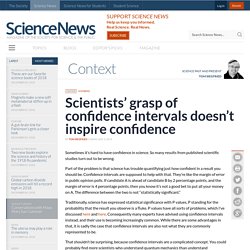
So many results from published scientific studies turn out to be wrong. Part of the problem is that science has trouble quantifying just how confident in a result you should be. Confidence intervals are supposed to help with that. They’re like the margin of error in public opinion polls. If candidate A is ahead of candidate B by 2 percentage points, and the margin of error is 4 percentage points, then you know it’s not a good bet to put all your money on A. Traditionally, science has expressed statistical significance with P values, P standing for the probability that the result you observe is a fluke. That shouldn’t be surprising, because confidence intervals are a complicated concept. Ordinarily you might see a confidence interval expressed something like this: The average weight loss for people on the new miracle drug was 4.6 pounds, with a 95 percent confidence interval of 2.2 pounds to 6.9 pounds.
But what does that really mean? Shadow Government Statistics - Home Page. FE Insights Fair lending analysis 051916. Regional Transportation District (RTD) Back To Previous Regional Transportation District (RTD) Add To My Trip 1063_20090715_866_RTD.jpg Map data ©2017 Google Terms of Use Report a map error Map Satellite Details Public transit for metropolitan Denver/Boulder.

Amenities General General Blocks to CCC: 6 Miles to CCC: 1 Yelp based on 14 reviews Read all reviews at Yelp.com Tiffany N. reviewed on Saturday, January 17, 1970 10:06 PM So Ive been living Denver for four years and no idea about the SkyRide and that makes me sad. Read Entire Review Rahhal D. reviewed on Sunday, January 18, 1970 7:26 AM No good idea to take trains at the airport it bad take while to get to downtown and it brakes all the time! Read Entire Review. Greer. Calling Bullshit — Syllabus. Logistics Course: INFO 198 / BIOL 106B.
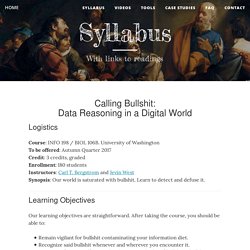
University of Washington To be offered: Autumn Quarter 2017 Credit: 3 credits, graded Enrollment: 180 students Instructors: Carl T. Bergstrom and Jevin West Synopsis: Our world is saturated with bullshit. Learn to detect and defuse it. Learning Objectives Our learning objectives are straightforward. Remain vigilant for bullshit contaminating your information diet. We will be astonished if these skills do not turn out to be among the most useful and most broadly applicable of those that you acquire during the course of your college education. Schedule and readings Each of the lectures will explore one specific facet of bullshit. Section31.pdf. Teacher effectiveness: Separate study confirms many Los Angeles Times findings. A study to be released Monday confirms the broad conclusions of a Times' analysis of teacher effectiveness in the Los Angeles Unified School District while raising concerns about the precision of the ratings.
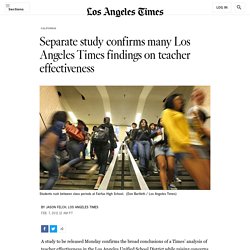
FOR THE RECORD:Teacher effectiveness: An article in the Feb. 7 LATExtra section about a University of Colorado study of L.A. Unified School District teacher effectiveness said researchers found that up to 9% of math teachers and 12% of English teachers ended up in different categories than those in a separate analysis by The Times. These percentages referred only to teachers whom The Times rated as more effective than average but whom the Colorado researchers found to be indistinguishable from average. The story should have included an additional 7% of math teachers and 10% of English teachers whom The Times rated as less effective than average but, according to the Colorado study, were indistinguishable from average. LA Times Refuted Line by Line. Research Study Shows L. A. Times Teacher Ratings Are Neither Reliable Nor Valid. New Research Shows Serious Flaws in the Research Behind the L.A.
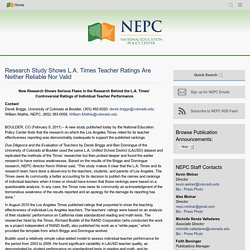
Times’ Controversial Ratings of Individual Teacher Performance Contact: Derek Briggs, University of Colorado at Boulder (303) 492-6320derek.briggs@colorado.edu William Mathis, NEPC (802) 383-0058William.Mathis@colorado.edu BOULDER, CO (February 8, 2011) – A new study published today by the National Education Policy Center finds that the research on which the Los Angeles Times relied for its teacher effectiveness reporting was demonstrably inadequate to support the published rankings. Separate study confirms many Los Angeles Times findings on teacher effectiveness. Students rush between class periods at Fairfax High School.
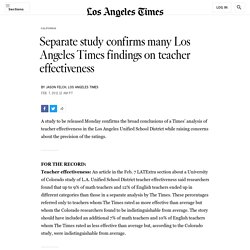
(Don Bartletti / Los Angeles…) A study to be released Monday confirms the broad conclusions of a Times' analysis of teacher effectiveness in the Los Angeles Unified School District while raising concerns about the precision of the ratings. FOR THE RECORD:Teacher effectiveness: An article in the Feb. 7 LATExtra section about a University of Colorado study of L.A. Unified School District teacher effectiveness said researchers found that up to 9% of math teachers and 12% of English teachers ended up in different categories than those in a separate analysis by The Times. These percentages referred only to teachers whom The Times rated as more effective than average but whom the Colorado researchers found to be indistinguishable from average. The authors largely confirmed The Times' findings for the teachers classified as most and least effective. » DiscussDo you think the value-added approach should be used to evaluate teachers?